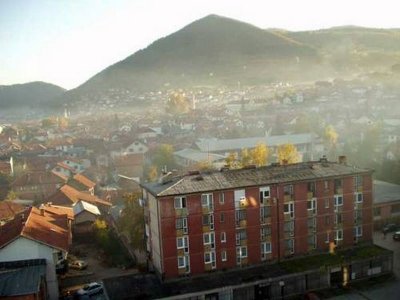 Protests against economic hardship are spreading in Bosnia and the war-scarred and divided country is finding it hard to cope.
Protests against economic hardship are spreading in Bosnia and the war-scarred and divided country is finding it hard to cope.
Bosnia’s Muslim-Croat parliament cancelled a session on Thursday rather than confront protesters complaining about its plans to pass a law cutting benefits to narrow a big budget gap.
Earlier in the week, mainly disabled protesters had burst into a session, embarrassing deputies from the other chamber who had just passed the draft.
It was the latest in a series of protests by workers and disabled people, some of them veterans of the 1992-5 war, angry at unemployment and tough measures to keep a lid on government debt that has ballooned with the global financial turmoil.
On Thursday, a highways official said demobilised soldiers blocked a major road in central Bosnia for several hours to demand delayed benefit payments and secure future funding.
“The country … is in crisis,” said Fuad Kasumovic, deputy finance minister in the central cabinet. “More and more people are losing their jobs, industries cannot get funding and financing is becoming more expensive.”
Such problems are now familiar across Europe, but Bosnia, ethnically divided during and after the 1992-95 war, does not have an operational central government capable of dealing with social unrest.
All executive powers lie with the two regional governments, running the Muslim-Croat Federation and the Serb Republic, which rarely coordinate policies and whose relations took a turn for the worse last weekend.
“Domestic politicians must recognise that the crisis has arrived in Bosnia and they must look for all possible ways to overcome it,” Kasumovic told Reuters. “Otherwise, we shall find ourselves in chaos and nobody will know how it will end.”
DIVISIONS
Serb Republic Prime Minister Milorad Dodik left weekend talks on constitutional reform, making their continuation conditional on the acceptance of the permanent status of the Serb region and its right to secede from Bosnia.
The other two leaders see this as unacceptable.
Dodik’s ultimatum followed the news that he and his aides were being investigated by state intelligence agency SIPA over possible corruption.
Saying the investigation was politically motivated and violated procedures, Dodik’s ruling SNSD party threatened to block the work of state bodies in a year seen as decisive for Bosnia’s progress towards EU integration.
To complicated matters, the country is without an international envoy after Slovak diplomat Miroslav Lajcak left the job early in February. The post was created after the United States brokered the Dayton peace accords to end the war in 1995.
The Dnevni Avaz daily reported on Thursday that Washington had rejected an Austrian diplomat as Lajcak’s replacement, insisting on a “stronger political personality” to deal with Bosnia’s complex politics.
The U.S. embassy declined to comment on the report, saying discussions on selection were still ongoing.
 Eurasia Press & News
Eurasia Press & News
